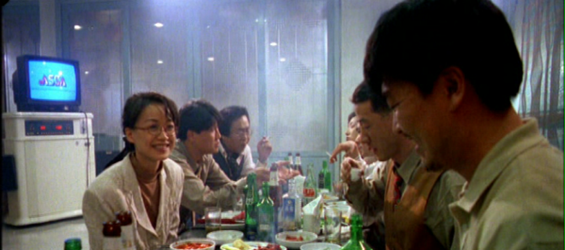The Day a Pig Fell Into the Well (Hong Sangsoo, 1996)

Hong Sangsoo’s debut is most strikingly different from his later work in its bleakness and formal conventionality[1]. He hasn’t adopted the zoom yet, nor is he rigidly adhering to the master shot aesthetic either: there are insert shots, over the shoulder perspectives, single dinner scenes cut into multiple camera angles--too close and too canted, dissolves, overhead shots, and simplistic but expressive uses of light and shadow. The bleakness comes from the male characters, as awful as any he’s ever made, their sins not just venal but erupting in violence, and not of the comic variety: the film is largely without humor. The trademark narrative splits are present, as is the preoccupation with the delusions of men as they attempt to relate to women. There’s even a deadpan dream sequence (at least one).
The film is split into four narrative tracks, involving the four nodes of a love quadrangle. The first is the most familiar from later Hong: an obnoxious writer is sleeping with two different women, one a young admirer of his work whom he uses to edit his writing and the other an older, married woman. He gets drunk too easily and creates a scene in a restaurant with friends and rivals, which turns violent when he repeatedly assaults the restaurant manager. The second story follows the husband of the married woman on his ill-fated business trip out of town, where he is ignored by the woman he is supposed to be meeting with and has a harrowing but ultimately pathetic encounter with a local prostitute in his dingy hotel room.
The third story tracks the young woman as she works a variety of jobs (movie theatre box office, personalized wake-up caller, anime porn voiceover recording) and is stalked by her young, obsessive coworker. The final story follows the married woman as she tries to meet up with the writer, possibly in a final break with her husband, but the writer seems to have disappeared. It’s her story that offers the one clear break with reality, as she dreams her own funeral (in which she wakes up from a nap and joins the other three principals in attending--leave it to Hong to have some one wake up from a dream in the middle of the dream they are dreaming). Near the end of the film, she has a vision of a horrific scene inside the writer’s apartment, which is probably real but might not be: given Hong’s later work we can speculate that she has imagined or dreamt it. Either way, she ends up back with her dreadful husband, perhaps infected with some terrible disease and possibly contemplating suicide, looking out her balcony at an eerie pink sky.
It’s an auspicious debut, Hong’s sense of pace keeps it from being the kind of depressing slog that characterizes so many films of its ilk. Like his later work, there are mysteries to be explored, but they’re more of the absent plot element variety than metaphysical explorations: Are the writer and businessman brothers? What happened to the married couple’s child? Exactly how many creepy men are stalking the young woman? Does anybody actually die? But with the men either being psychotic or pathetic and the women vague but innocent, the relationships feel more forced and schematic than the organic mix of positive and negative qualities that define his later heroes. The young woman is really the only likable character, and all she is is a victim of the men who pursue and exploit her. The older woman is similar to later Hong heroines, with her reality-altering consciousness, but she wanders through the film too passively to really identify with. Unlike Sunhi or Oki, in other four character films, she lacks any kind of agency. The result is an angry film, without the distance of irony or the possibility of hope.
Way back in 2013 I watched The Day a Pig Fell into the Well and read the short story from which it takes its title. I was going to write about the relation between the two, but I only got two paragraphs in and ended up abandoning the review. Now I can’t exactly remember what my thinking was, but this is what I wrote at the time:
“The title comes from a John Cheever story (printed in the October 23, 1954 issue of The New Yorker) and though the plot is unrelated, the story might provide a key to unlocking some of the mysteries in Hong’s work: the fungibility of memory and the decisive turning points in our lives that we only recognize as high-water marks long after they’ve passed and we’ve declined.” ↩︎
